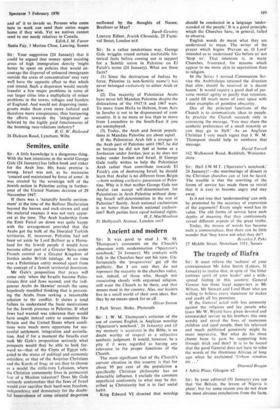Ancient and modern
Sir: It was good to read J. W. M. Thompson's comments on the Church's obsession with modernisation (Spectator's notebook,' 24 January). My contacts with folk in the Churches bear out his view. Un- fortunately the 'progressives' get all the publicity. But I am sure they do not represent the majority in the churches today, nor, indeed, of those who, though not associating closely with organised religion, still want the Church to be there, and that means most in the country. Alas, our leaders live in a small world of their own ideas. But they by no means speak for us all.
Oliver Sutton 3 Park Street, Stoke, Plymouth Sir : J. W. M. Thompson's criticism of the use of current English in Anglican worship ('Spectator's notebook', 24 January) and (if my memory is accurate) in the Bible, is no doubt worthy of respect as a subjective aesthetic judgment. It would, however, be a pity if it were regarded as having any relevance to the proper functions of the Church.
The most significant fact of the Church's current situation in this country is that for about 95 per cent of the population a specifically Christian philosophy has no detectable influence. I exclude the common superficial conformity to what may be des- cribed as Christianity but is in fact social habit. King Edward VI directed that worship should be conducted in a language 'under- standed of the people.' It is a good principle, which the Churches have, in general, failed to observe.
English words do mean what they are understood to mean. The writer of the prayer which begins 'Prevent us, 0 Lord' intended us to understand 'Go before us' not 'Stop us'. That intention is, in many Churches, frustrated, for reasons which appear to me more akin to superstition than to religion.
In the Series 1 revised Communion Ser- vice the Archbishops retained the direction that alms should be received in 'a decent bason.' It would require a good deal of per- verse mental agility to justify that retention. I could fill much more of your space with other examples of pointless obscurity.
One of the principal functions of the Church is to communicate ideas to people. In practice the Church succeeds only in conveying the message, 'You may share the aesthetic preferences of a small minority or you may go to Hell.' As an Anglican Christian I very much regret that J. W. M. Thompson should help to reinforce that message.
David Torvell 162 Walkwood Road, Redditch, Worcester- shire Sir: Hail J.W.M.T. ('Spectator's notebook,' 24 January)!—the murmurings of dissent in the Christian churches can at last be heard. The trouble is that the rewriting of the forms of service has made them so trivial that it is easy to become angry and stay away.
Is it not true that 'understanding' can only be promoted by the accuracy of expression of the argument? Every single word has its value. The old forms of service have such depths of meaning that they continuously reveal different aspects of the great truths. Today, the misuse of words has become such a commonplace, that there can be little wonder that `they know not what they do'! Beverley 1. Pyke 27 Middle Street, Shoreham 3311, Sussex


































 Previous page
Previous page